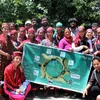This all-women’s team from a small industrial town in Gujarat is working to make menstrual cups mainstream
Started in 2016, Gujarat-based DEA Corp, which is working to make menstrual cups mainstream, is using WhatsApp for everyday communication and operations at work
Discussing menstrual hygiene is still a taboo in India. But alongside the menstrual hygiene products that are available in the market, a new breed of conscious consumers are looking for eco-friendly menstrual hygiene products – among these is the menstrual cup. While menstrual cups are still not the conventional option for many, there are entrepreneurs and organisations who are working to change this.
Among them is DEA Corp, an all-women’s team that believes periods should not be viewed as a hindrance to women.
Smita Amol Mane, Founder, DEA Corp, says, “Not having to worry about leaks, stains, or rashes is liberating. Also, even with the best of sanitary pads, women are compelled to tolerate discomfort. That is where a menstrual cup stands apart. It is not only one of the most hygienic, safest, and comfortable options compared to chemically treated pads and tampons, menstrual cups are also most environment friendly.”

The DEA Corp team is promoting sustainable menstrual hygiene
Started in 2016, DEA Corp offers premium menstrual cups made of medical-grade silicone. Priced at about Rs 2,500, DEA Cup is slightly more expensive than most other menstrual cups available in the market.
“The quality of the cups and the design is what makes it a premium product. The high-quality silicone is imported from Germany and is US FDA approved. But, the cup is a one-time investment and can be used for 10 years. If you do the math, it’s a tenth of the cost of using pads or tampons for the same period. And, more importantly, you will not have to carry the guilt of harming the environment.”
Based in the industrial town of Vapi in Gujarat, the team has so far focussed on marketing the product in their hometown.
Smita says, “A lot of our efforts have been directed towards building awareness and following it up with direct selling. We participate in exhibitions and also use WhatsApp to reach out to customers and prospective customers.”
Explaining how WhatsApp has aided business, she says, “What we have realised is that there are predominantly two kinds of customers: the ones who do not know what the cup is, and others who know about menstrual cups and their advantages but haven’t made the switch because of unanswered questions. So, WhatsApp has become the platform to answer those questions. We share videos, images, and even do video calls to help customers with not just pre-sales queries, but also answer any questions after they have bought our product. Also, we get a lot of in-bound business queries on WhatsApp, and these are often people who have heard about us from our existing customers because WhatsApp has become the most accessible platform in India.”
Adding to the complexity of running a business where there are already established players, is the challenge of gaining trust and mindshare.
“Sharing customer experiences and media coverage via WhatsApp with our existing customer base and prospective customers is working well to address that challenge,” says Smita.
In addition, DEA Corp also uses WhatsApp for everyday communication and operations at work. “We share PDF documents, presentations, and work updates,” says Smita. “It makes managing work simpler, efficient, and fast.”
The all-women team who have done everything from designing the product, prototyping, setting up the plant to branding, marketing and content creation, are equally passionate about promoting menstrual hygiene among women across age group, especially students.
“Students are in a good position to break prevailing taboos and the obvious silence on menstruation.” In addition to raising awareness on menstrual hygiene via demonstrations and door-to-door meetings, the team actively works with schools and colleges. “
The founder says that she is aware that helping women make the transition to the cup isn’t easy.
“It may take time to find the best method to insert the cup, but you have to be patient and try it out. The eventual relief will negate the initial hiccups. We have seen how liberating and hassle-free periods can be with menstrual cups. When we hear positive experiences from our customers, it makes us believe that we can empower many others like them.”
Edited by Megha Reddy








